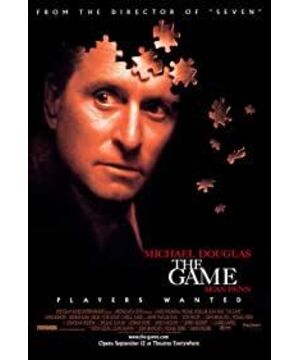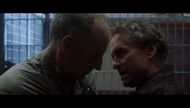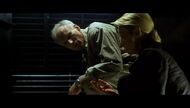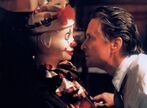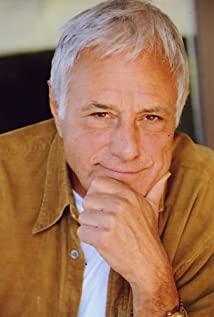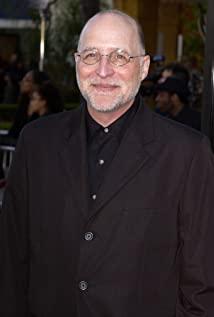One · Out of control
The protagonist Nick is a "man who owns everything". Not only do others view him this way, it is also the image he strives to build for himself. No need to seek help from others, no need to rely on anyone emotionally and materially, to make him feel safe and strong. Clear and cold profit goals and instinctive resistance to accidents and unknowns are all "stubborn diseases" that the capital giant must contract on the road to success.
The film implies that Nick’s father’s suicide was due to a similar “severe illness”. No one has ever worried that he will commit suicide (just like Nick always tells his friends that he is fine, there is no need to worry about him), but in the face of some kind of pain that he can't solve with his own power, he suddenly does Out of extreme choice.
The confrontation with the game provider CRS has made Nick lose his understanding and control of the situation like never before. It was almost a losing battle. Even if he crawled out of the cemetery, even if the audience was angry with the evil forces because of his helplessness, Nick still did not admit defeat. Perhaps the six hundred million dollars deceived could make another profit, but he would never be reconciled without the truth. He began to ask for help, whether it was hoping that the sympathy of a stranger would allow him to take a ride back to the U.S., or borrowing a car from his ex-wife and telling her that he was the only person he could trust (because he was never forced to trust him) situation).
Let Nick experience a "suicide" in this extremely realistic game to avoid possible tragedies in real life. This should be the purpose of his brother Conrad's birthday gift. Of course, the audience almost thought that this was a joke that was too big to cause tragedy.
Even if such a game is not 100% impossible in real life, its existence inevitably implies too many out-of-control factors. It is not only necessary to prepare in advance through a comprehensive understanding of the protagonist, but also to react according to the protagonist’s unpredictable response. He cannot be allowed to see through this well-intentioned scam (otherwise the "nightmare" will lose its efficacy), nor can any of the "fatal links" bring real risks. So it's just a dream that can't happen in real life, but when the nightmare wakes up, the gratitude for the "resurrection" and the happiness that is lost and regained cannot be more real.
No matter whether Nick didn't know at all or just vaguely knew what he was "missing", at the end of the game, he seemed to have really found the truth about himself. It seems that only this kind of madness that breaks the daily order can put the protagonist (and even the audience) in an unfamiliar situation, thus triggering some thoughts that cannot be touched in the busyness and inertia.
II·Magic
When a magician is preparing to perform magic, don't believe what he said. He will never tell you when the magic really started. Because cheating you is the best service to you.
If the magic is to be revealed at the end, it also means that the magician is confident enough. This magic is the only experience that is difficult to reproduce in terms of technology and spiritual impact. It is even very possible (just like the tailor-made services provided by CRS) that it will not be able to display its true charm unless it tells the core secret of the magic after a successful fraud.
However, there are many details in this costly group magic that have not been explained. They maintain the qualities that magic should have. For example, the audience can see that Nick had accidental contact with many suspicious characters at the airport or their attention was distracted by their presence, but they did not know when the box full of compensation was replaced. It can't be opened for one. Similarly, Christine had countless opportunities to put the hotel key into Nick's suit pocket during the previous eve of the city adventure, but Nick still felt a certain surprise when he found the key in his pocket.
Great magicians are always good at using human psychology, manipulating their audiences, and letting them behave exactly as they expect. Of course, not all "driving forces" are as straightforward as going to the bathroom to wash your clothes immediately after being soiled by a leaking pen. Nick was able to allow himself to be deceived by Christine again after discovering that Christine's home was just a "stage setting" because he was eager to relieve the suspense.
The more you want to get the answer, the more distant you are from the answer.
When Nick reported the password, Kristen was obviously eavesdropping, and it was possible that the audience thought that he was closer to the truth than Nick, because this was obviously a scam gang's customary method of attracting people to be hooked. But after the scam was unveiled, there was a bigger scam.
Pretending that there are real bullets in the pistol is an accident, pretending to be revealed can only delay time by continuing to lie, pretending that the tragedy has led to regret... Such a simple truth, the magician expected, is not surprising.
If there is no last reversal, the story makes sense, but the clever thing is that when I watch it the second time, I feel that the truth is not so baseless. For example, a careful audience can already notice that in the seemingly violent fire attack at Christine's house, all the bullets seemed to hit the ceiling. Taking everything that belonged to Nick and putting him in a coffin, but leaving behind a valuable watch that could help him survive, was a suspicious point. Although it may be just a negligence of the bad guy, or a little compassion towards his victim.
The part of Nick and Christine’s urban adventures is more in line with the audience’s initial expectations of CRS—make your life fun. Jumping from a tall building into a dustbin with a buffer effect is almost a preview of the final answer. It's like trying an extreme sport that makes people feel fresh. But since hitting the overflowing toilet in the hotel, that relaxed or even slightly romantic "adventure" began to drive at high speed towards the suffocating smile of the god of death. When the car fell into the water, Nick tried to comfort himself: this is just a game, and it will not cause real harm. But this is just an instinctive reaction in despair, and has nothing to do with real hunches.
The fear of yourself being unarmed in a huge conspiracy, the fear of the enemy knowing everything about yourself and you don’t even know who the enemy is, make this harmless game seem so real and you can’t carry the game at all. The mentality to enjoy the process. But when we know the truth and look back, we may not hesitate to conclude that this is an interesting game. And those conjurers suddenly seemed to be more lovable.
Three. Ceremony
Setting up obstacles for the protagonist and ensuring that he can pass the level smoothly is the general technique of the game. It doesn't sound very exciting. However, although CRS has set the obstacles extremely "malicious", it also guarantees that the protagonist absolutely clears the customs without exception. What's commendable is that "difficulty" is not its purpose, but just a means to relieve the host's heart disease or trauma.
Therefore, the essence of the service provided by CRS is more like a healing magic than a game. Mystery is both a mystery and the answer.
When the owner shared his own body and smashed the prop glass on the hotel roof and fell on a huge "mattress", the answer "had to" was revealed for him. This "suicide" was a ceremony tailored for him. At the moment when he surrendered to fate, at the moment of destroying and giving up lighting the festive fireworks, he finally got it, something he had been looking for but did not know what.
There is the so-called breaking of the "fourth wall" in drama theory, that is, the side formed by the audience. There is no longer a clear line between the story on the stage and the audience. In a real game, there may be fifth and sixth walls, which correspond to the real limitations under your feet and the fantasy world above your head, respectively. This puts the person under the spotlight in a "dilemma".
When Nick smashed his Rubik's Cube by suicide, reality and illusion were reversed again.
Reality exists only because we think that we have a good reason to believe that it is real. But in some unusual moments, a more eternal secret will suddenly be glimpsed-real flow and uncertainty.
The desire to control is a terrible weapon. It uses its own hardness to take everything for granted, but it cannot escape, its own extremely fragile characteristics.
When the prank of "the lights went out suddenly and hundreds of people ran away" ended, Nick explained to Kristen the trouble he had encountered and the wrong choice he made accidentally, and he did not care that the object of the talk was an employee of CRS. , He began to accept the fact that he couldn't keep everything under control after all, and frank communication is a kind of need that makes him happy but has been suppressed by his character.
For a long time, his father's suicide made Nick feel a curse from his genes. This kind of psychological hint also made him seem to be paving the way for the fulfillment of the curse with his own hands. Perhaps he had already had the nightmare of being alone when he died, but when the Rubik's Cube was reunited, the solid earth was generously dedicated to him, the liveliness and joy of friendship. If the truth can be destroyed at any time, like the sudden return of a bank account to zero, what can be truly believed? Perhaps only the cognition of self and human beings can provide a more reliable "sense of security" than a museum-like mansion.
When the film industry first emerged, going to the theater was often described as a sacred religious experience. Stepping into the dreams of other people (since reality is difficult to establish, let's treat all events in the psychic category as dreams), we try to see ourselves, this "hell".
Brecht once proposed a kind of "distance effect" in drama: the actor and his role are always in a state of estrangement, so that the role can be analyzed from a critical perspective. So the actor is both the audience and the character itself. Perhaps in any film, the audience should become the real protagonist. The life, death, sorrow and joy of the characters in the film are all fake to the audience, but the impact of the film on the audience can be very real and far-reaching.
View more about The Game reviews


